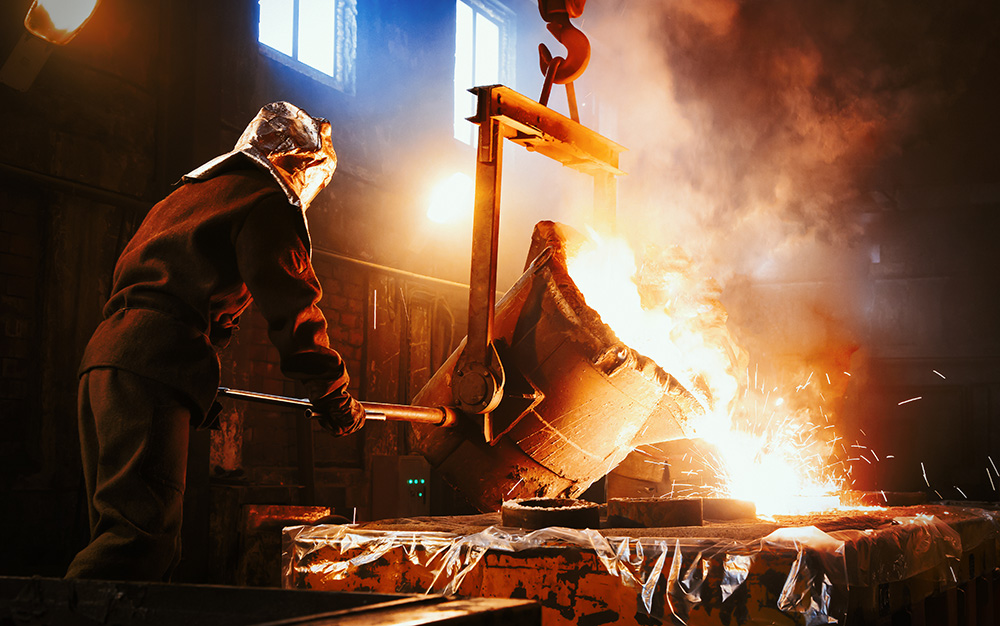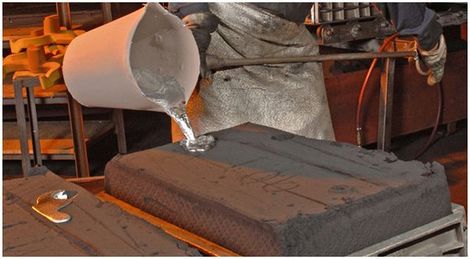Environmental impact in today’s Aluminum Foundry operations
Exactly How a Metal Foundry Contributes to Sustainable Metal Production Practices
Metal foundries play a vital function in advertising sustainability within the metal manufacturing sector. By incorporating recycled materials, they decrease dependence on virgin sources and lessen ecological impacts. Energy-efficient melting processes further minimize power consumption and exhausts. However, the trip toward lasting practices involves greater than just recycling and power management. It encompasses a broader commitment to honest sourcing and cutting-edge technologies. The effects of these practices are considerable and warrant more detailed exam.
The Function of Recycling in Metal Foundries
While metal production has typically depended on virgin materials, the raising emphasis on sustainability has resulted in a substantial change in techniques, specifically in metal foundries. Recycling has actually become an essential component of this change, enabling foundries to repurpose scrap metal and decrease dependence on extracted resources. By integrating recycled products right into their processes, foundries not just reduce environmental influence yet additionally lower manufacturing prices.
The use of recycled metals, such as steel, copper, and aluminum, minimizes energy intake and decreases greenhouse gas discharges related to standard mining and refining methods. Moreover, foundries can achieve premium outputs by utilizing advanced sorting and handling innovations to assure the pureness of recycled products. This focus on reusing fosters a round economic climate, where waste is reduced, and resources are made use of efficiently. Metal foundries play an essential duty in promoting sustainable methods within the metal manufacturing market.
Energy-Efficient Melting Methods
Energy-efficient melting strategies are crucial for improving sustainability in metal production. These strategies significantly lower energy usage throughout the melting process, which is one of the most energy-intensive phases in metal manufacturing. Technologies such as induction melting, resistance home heating, and microwave melting deal boosted effectiveness contrasted to standard methods. Induction melting, for instance, utilizes electromagnetic areas to generate heat directly within the metal, decreasing power loss and supplying accurate temperature control.
In addition, implementing warm healing systems can better enhance effectiveness by reusing and capturing waste warm created throughout melting. Using sophisticated insulation products and maximizing furnace styles additionally add to energy savings. By embracing these innovative melting methods, metal foundries can decrease their carbon footprint, reduce operational expenses, and add to an extra sustainable production landscape. The integration of energy-efficient methods not just aligns with environmental objectives however likewise fulfills the growing demand for accountable production techniques in the metal industry.
Lasting Sourcing of Raw Materials
Lasting sourcing of raw products is crucial for lessening the environmental effect of metal manufacturing. This includes the raised usage of recycled metals, the adoption of honest mining practices, and efforts intended at local sourcing. By prioritizing these approaches, the sector can advertise responsible source monitoring and support local economies.

Recycled Metal Usage
Just how can markets successfully reduce their ecological effect while satisfying the expanding need for metal? One considerable strategy is the utilization of recycled metal. By including scrap metal right into their production procedures, foundries can reduce the extraction of virgin products, thus conserving all-natural sources and lowering energy intake. Recycled steels call for much less energy to process contrasted to their raw equivalents, resulting in lower greenhouse gas discharges. In addition, using recycled metal assists draw away waste from garbage dumps, promoting a round economic climate. Industries that prioritize recycled metal not just contribute to sustainability yet additionally take advantage of price financial savings related to reduced product purchase. Recycled metal utilization stands as an important approach for ecologically accountable metal production.
Ethical Mining Practices
While the need for metals remains to rise, sectors are progressively acknowledging the importance of honest mining methods in making sure responsible sourcing of basic materials. Honest mining incorporates a commitment to ecological stewardship, social responsibility, and adherence to fair labor techniques. Companies are now prioritizing collaborations with mines that show transparency in their operations, minimizing eco-friendly effect and valuing local areas. This technique not only cultivates a lasting supply chain yet likewise enhances the track record of companies entailed. By executing rigorous standards and qualifications, sectors can combat prohibited mining tasks and promote the welfare of workers. Inevitably, ethical mining techniques contribute markedly to a more lasting metal production ecosystem, aligning financial growth with ecological and social honesty.
Local Sourcing Efforts

Advancements in Metal Casting Procedures
Technologies in metal casting processes are changing the industry by incorporating innovative recycling methods that minimize waste. Energy-efficient melting techniques are likewise being developed to reduce power usage throughout manufacturing. Furthermore, the use of innovative mold and mildew materials adds to improved performance and sustainability in casting operations.
Advanced Recycling Techniques
Advanced recycling strategies are changing metal casting processes, significantly boosting sustainability in the industry. These developments focus on recycling and redeeming scrap metal, substantially decreasing waste and the requirement for virgin materials. Strategies such as hydrometallurgy and pyrometallurgy enable foundries to remove beneficial steels from made use of components, guaranteeing efficient resource use. Furthermore, progressed sorting and filtration modern technologies boost the top quality of recycled steels, making them appropriate for high-performance applications. This not just lessens the environmental footprint of metal manufacturing however also why not try this out cultivates a round economic climate by promoting the reuse of products. As these recycling methods remain to evolve, they promise to further streamline procedures within foundries and add to a much more lasting metal view it production landscape.
Energy-Efficient Melting Techniques
While standard melting techniques have actually long been the foundation of metal casting, current advancements have actually presented energy-efficient strategies that significantly minimize power consumption and emissions. Technologies such as induction melting and electric arc furnaces have actually obtained importance, enabling specific control over temperature level and reducing the need for nonrenewable fuel sources. These techniques not just enhance power effectiveness but likewise advertise much faster melting times, which translates to decrease operational expenses. In addition, developments in warm healing systems make it possible for foundries to catch and reuse excess warmth created throughout the melting process. This holistic approach to power administration not only sustains lasting practices however additionally placements metal foundries as leaders in the change towards greener production procedures, additionally aligning with global sustainability goals.
Cutting-edge Mold Products
As the need for more sustainable and reliable metal casting procedures grows, the expedition of innovative mold products has come to be a prime focus in the market. Traditional mold materials usually add to environmental difficulties, motivating the search for options that lower waste and energy intake. Recent improvements consist of the advancement of recyclable composites and naturally degradable binders, which not only enhance mold performance however likewise reduce environmental impact. Additionally, the usage of 3D printing technology in mold development enables complex designs that lower material usage and enable rapid prototyping. These innovative materials not only boost casting accuracy however also straighten with sustainability goals, showcasing the market's dedication to decreasing its carbon footprint while maintaining premium production requirements.
Reducing Waste With Advanced Technology
Ingenious technologies are transforming the metal production sector by substantially lowering waste and improving efficiency. Advanced data analytics and artificial intelligence formulas enable foundries to maximize production procedures, lessening and identifying ineffectiveness scrap product. Smart sensors keep track of devices performance in real-time, permitting for anticipating maintenance that decreases downtime and waste generation. Furthermore, additive manufacturing techniques, such as 3D printing, permit the creation of facility components with minimal product use, markedly lowering waste compared to standard techniques.
Closed-loop systems are ending up being more common, where scrap metal and results are reused back into the manufacturing cycle, making sure that materials are utilized to their max possibility. This combination of modern technology not just advertises resource preservation however also boosts the total sustainability of metal manufacturing methods. By embracing these improvements, foundries can add to a much more sustainable future while maintaining competitiveness on the market
The Impact of Foundries on Carbon Footprint Reduction
Foundries play an essential duty in reducing the carbon impact of the metal production sector by implementing numerous sustainable methods. By using energy-efficient technologies, such as electric arc heaters, these centers significantly lower greenhouse gas exhausts compared to traditional methods. In addition, foundries increasingly embrace renewable resource resources, which additionally lessens their reliance on fossil fuels.
Reusing scrap metal is an additional essential practice that foundries use, conserving resources and reducing the requirement for virgin materials. This not only lessens waste however additionally lowers the energy-intensive removal procedures connected with mining. Furthermore, the fostering of closed-loop water systems assists to reduce water use and minimize wastewater discharge, adding to an extra lasting operation.
Through these initiatives, foundries show their commitment to ecological stewardship, causing a significant reduction in the total carbon impact of the metal manufacturing sector. Their continuous initiatives are crucial in the change towards an extra sustainable industrial landscape.
Frequently Asked Questions
What Sorts of Metals Are Most Commonly Recycled in Foundries?
Light weight aluminum, brass, copper, and steel are amongst one of the most generally recycled metals in foundries. These steels are favored due to their visit here high recycling rates, economic worth, and prevalent availability, adding significantly to industrial sustainability efforts.
How Do Foundries Make Sure the Quality of Recycled Materials?
Foundries ascertain the top quality of recycled products with extensive screening, sorting, and purification procedures. They implement innovative modern technologies to examine make-up and get rid of impurities, guaranteeing that the recycled metals fulfill market criteria for performance and safety and security.
What Accreditations Exist for Lasting Foundry Practices?
Various certifications exist for sustainable foundry techniques, including ISO 14001 for ecological monitoring, ISO 50001 for power management, and LEED certification for sustainable structure practices (Aluminum Casting). These accreditations aid ensure adherence to environmental and sustainability criteria in operations
Just How Do Foundries Measure Their Carbon Footprint Decrease?
Foundries gauge carbon footprint reduction through tools like lifecycle analyses, energy audits, and emissions tracking systems. They compare standard discharges to present results, assessing improvements in energy efficiency, product usage, and sustainable energy fostering in time.
What Are the Economic Advantages of Sustainable Metal Manufacturing?
Lasting metal production provides financial advantages such as lowered functional expenses, increased efficiency, improved market competitiveness, and prospective government rewards. In addition, it fosters advancement and brings in eco mindful customers, inevitably driving long-lasting profitability for companies.
Metal foundries play a necessary duty in advertising sustainability within the metal manufacturing industry. While metal manufacturing has actually commonly depended on virgin products, the boosting emphasis on sustainability has actually led to a significant change in practices, especially in metal foundries. By incorporating scrap metal right into their production processes, foundries can decrease the extraction of virgin products, therefore conserving natural resources and minimizing power consumption. Foundries play an essential role in reducing the carbon footprint of the metal production sector by implementing different lasting practices. Recycling scrap metal is one more vital practice that foundries use, conserving sources and reducing the demand for virgin materials.